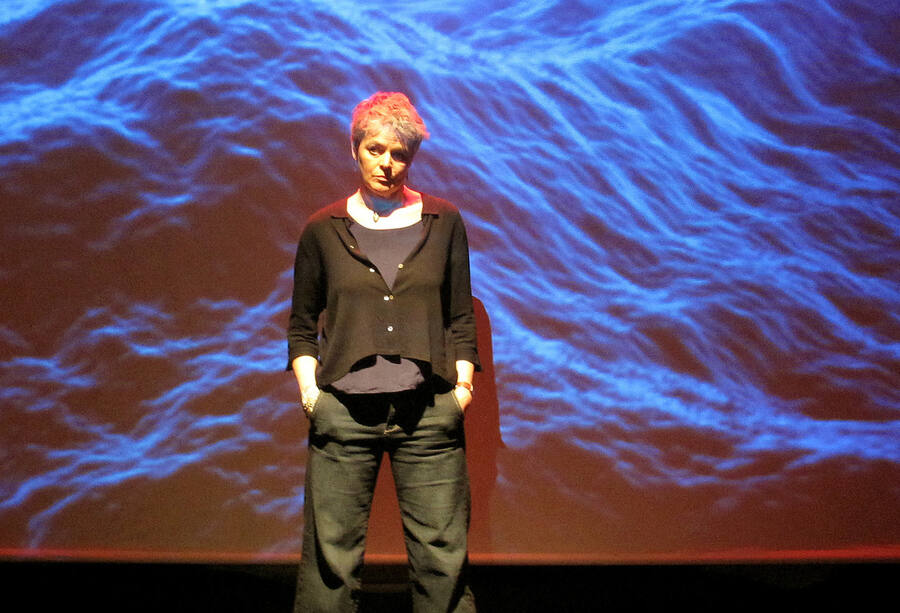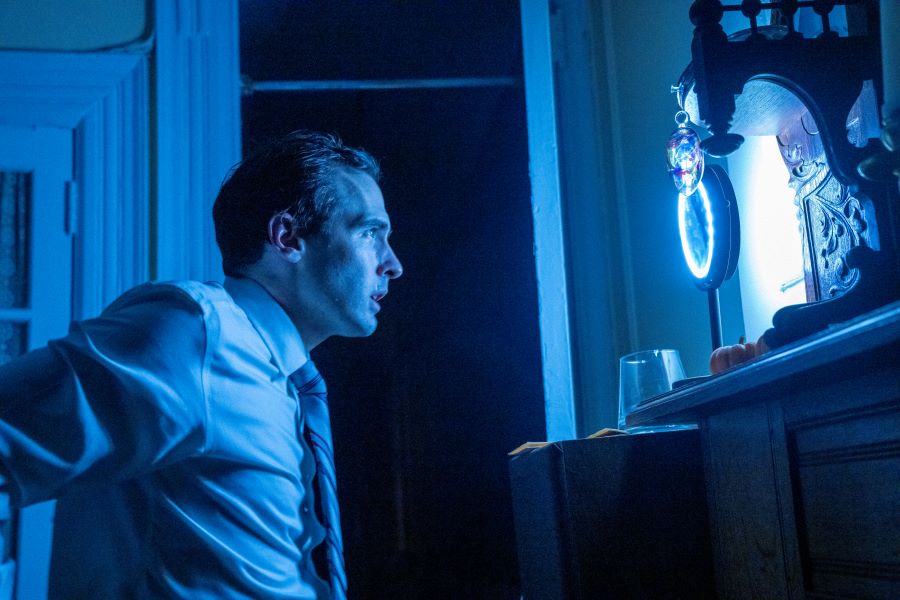The following is the preface to The Greek Plays 2, Ellen McLaughlin’s second collection of adaptations and modern reimaginings of classic Greek tragedies, now available via TCG Books. McLaughlin will be joined by her acclaimed Angels in America co-star Kathleen Chalfant to celebrate and discuss this new publication at Center for Fiction in Brooklyn on Feb. 26 at 7 p.m.
It’s been exactly 30 years now since I began, with my adaptation of Electra in 1994, my encounter with the ancient Greeks in these versions of their literature and myths. The sister volume, The Greek Plays, published in 2005, includes the first six adaptations I wrote, involving plays by the three great tragedians, Aeschylus, Sophocles, and Euripides, as well as a version of Aristophanes’s comedy Lysistrata. This volume similarly contains adaptations based on plays by all three tragedians, but also includes a music-theatre piece, Penelope, inspired by Homer’s Odyssey, and a short play, Conversations at the Return of Spring, the source of which is the myth of Demeter and Persephone.
The work included in these volumes makes up a great part of what I have done as a playwright over a long career. But with this second volume of work inspired by the Greeks, I feel I’m bringing a rich conversation that has lasted decades to a close. I can only be grateful for the way these meetings with the dead have sharpened my sensibility, awakened my instincts, and challenged my skills. With every assignment I’ve taken on, the Greeks have taught me crucial lessons about my craft and given me insights into myself I would not have received elsewhere.

Ajax in Iraq, the first play in this volume, was written in 2007-2009 during the bloodiest years of the Iraq War. The Oresteia, the last and most recent play, was finished in 2019 amid the Trump presidency. These have been tumultuous times for the world, terrifying for democracy, and hard to navigate as a citizen, let alone as an artist. But the Greeks have helped me. It has been a comfort to remember that they made their great work as their world buckled and heaved with its own bad times and that what they created endures beyond the politics and crises of their era.
What the Greeks have given me as a writer is courage and size. If you’re dealing with the Greeks, you can’t just make little plays that stay safely within the bounds of what’s easily achievable. I’ve found that liberating. Scary in the right way. There is nothing tidy, nothing settled, at the end of a Greek play. These aren’t nice pieces of literature you savor with your glass of sherry; they bleed all over the floor if you try to bring them inside the house. There’s an exhilaration to the ambition, the chutzpah, of the Greeks. I wanted to engage with that and so I let the Greeks lead me where they did.
I’m always struck by just how disturbing Greek plays are. At the center of each one there is an unthinkable thought, a terrible image that is designed to jolt us into a struggle with the ethical conundrum that the play circles but can never resolve. As a writer in conversation with them, I have found that the only way to encounter these plays authentically and fruitfully is to embrace their difficulties, to head toward the darkness. When students I teach find the ancient plays offputting and hard, I don’t try to convince them otherwise. They are. I advise them to value and pay attention to the aspects of the work that confound and disturb them. These plays were not intended as academic exercises or to be mastered through analysis. They are intended to shock, to defy logic, to move deeply into the psyche and do their work. When writing in response to one of these plays, I have to stop dithering on the surface and just drop down into the cave of it, enter the depths, and see what I can discover there. It takes time, sometimes years, but I will find something, an odd dreamlike fragment that is born of these works but is also passionately and undeniably mine. Once I find that, I can begin.
To write each of these plays, I had to wait for some image to break in me that refused analysis and lifted me away from an intellectual, dutiful stance into creative urgency. Antigone in a 1930s housedress knocking Morse code on a wooden door; Odysseus as a brain-wounded veteran sitting in an armchair looking out to sea, waiting for his own return; the gray ribbon that Mercury ties around the wrists of the dead when he takes us to the Underworld—those were some of the tickets to the rides these plays took me on.
In my preface to the first volume of The Greek Plays, I wrote that I found Greek plays uniquely useful when addressing war, both its majesty and its horrors. But in looking at the plays assembled for this second volume, I realize that what they share has less to do with my continuing desire to address war and its effects than with my personal history over the past years, which has included a reckoning with death and loss—a subject that the Greeks treated in all their literature and about which, as with war, they were exquisitely, searingly eloquent.
No matter how much we ache to bring our loved ones back to life, whenever that desperate wish is actually granted, in play after play, myth after myth, it does not go well.
There is an ancient belief that the gods send us sorrows so that we will have stories to tell, and every human life will eventually tender its stories of loss. Losing, as Mercury says in my play Mercury’s Footpath, is all we mortals ever do. “From the moment of your birth you begin scattering your possessions like so much seed—baby teeth, innocence, hopscotch pebbles—right up until the moment of your death, when you abandon pulse, sky, color, music, life, life, life.” My father died in 2005 and my mother died in 2016, and those losses, different but crucial, have informed and deepened my work over the time that this volume spans. They have endowed me with my own stories but also stirred in me a need for the stories of others, and the Greeks tell some of the best. All these plays involve encounters with the dead or the suicidally death-bound, and all of them attempt, as the Greeks so often did, to grapple with the mystery of death and the two great questions it inspires: What do we owe to life and what do we owe to the dead?
The play in which these questions are most starkly weighed is Antigone—which I adapted as Kissing the Floor—but the Greeks were considering them throughout their literature and culture. They were a people of the present tense, as is apparent in their vital embrace of life, with all its sensual thrill, bitter anguish, peril, and passing delight. Their idea of death was as bleak as any I can think of. Nothing so vivid as a heaven or hell in store for them. They foresaw an eternal existence of aimless wandering in silence and shadow, homesick for the sharp air and sunlight to which they could never return. Sure, there are the Elysian Fields for the few and famous, but even there, where warriors might stride about in their clanking armor forever, there was nothing to quicken the heart or engage the spirit. When questioned by Odysseus at the mouth of the Underworld, Achilles says memorably that he would rather live a brutal life as the slave of a hard master than spend the rest of eternity as the king of the dead. This view of death has always struck me as bracing and right, and I find their queasiness in contemplating the return of the dead to the living world reasonable. No matter how much we ache to bring our loved ones back to life, whenever that desperate wish is actually granted, in play after play, myth after myth, it does not go well. People who live in the present understand that all we can ever know, whether it is through suffering or joy, can only be known while we live.
What do we owe the dead? I’ve faced this question personally through these plays, but I realize that it’s also an issue that is at the heart of any conversation with the literature of the past. There’s a necessary struggle in creating the new while honoring the old, the essential artists we venerate whose work has determined so much of our aesthetic and shaped our sensibilities. Reverence—awe—is important. If you had never felt it, why would you want to make art in the first place? But there are limits to reverence; there comes a point when you have to transcend it in order to take your own work as seriously as you take the art that inspired you to do it. When it comes to the dead poets who wrote the ancient plays I have spent so much of my life trying to reckon with, I want the audience to understand what’s happening onstage, not at a safe distance, but as close as breath. These plays should be as disturbing, beautiful, and immediate as they ever were in what they demand from us. That is what I think we owe the dead. We must meet them where they stand and take up their challenge to find our own ways toward what they do, which is to articulate on the highest level what it is to be human.
It’s not surprising that the Greeks, with their highly attuned sense of the fleeting moment, invented the theatre as we know it. Because theatre people are also people of the present. We know that once the brief run of a play is over, it’s gone from the world. That is the heartbreaking and piquant lesson of every final performance. Our short, bright existence above the ground is all we have. Let us pay attention, let us revel in it, now, now, now, while we can.
Ellen McLaughlin is a poet, playwright, and performer whose plays include A Narrow Bed, Iphigenia and Other Daughters, Tongue of a Bird, The Trojan Women, Helen, The Persians, Oedipus, Septimus and Clarissa, and Blood Moon.
Support American Theatre: a just and thriving theatre ecology begins with information for all. Please join us in this mission by joining TCG, which entitles you to copies of our quarterly print magazine and helps support a long legacy of quality nonprofit arts journalism.





